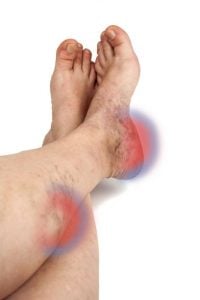Potential complications – vein surgery?
Any surgery involves risk, and may become serious or life threatening in some instances. These complications can develop during or after the surgery. The risk of potential complications pre or post surgery can be greatly reduced by following the treatment plan provided to you.
The risks of vein surgery include:
- Anesthesia reaction (allergic reaction) and problems with breathing
- Bleeding which may lead to shock
- Blood clots, most commonly in the form of deep vein thrombosis (DVT)
- Infection
Potential complications of varicose vein surgery:
- Bruising
- Change of skin color near removal area
- Damage to other veins
- Inflammation of the remaining vein or incision site
- Numbness near affected area
The risk of certain complications may be reduced by the follow treatment plan:
- Follow physical activity, dietary, and lifestyle restrictions provided by your doctor
- Avoid heavy lifting and strenuous exercises
- Inform your doctor or radiologist of a possible pregnancy
- Inform your doctor immediately of any bleeding, fever, pain increases, wound redness, swelling, or discharge
- Use medication and compression stockings as directed
- Inform health care team of any allergies present
Who Is A Good Candidate For Vein Surgery?
A dermatologist or vascular medicine specialist will evaluate your candidacy for sclerotherapy during your initial visit before the procedure.
Unless they have previously been determined to be unusable, veins that may one day be used for heart bypass surgery will typically not be considered for sclerotherapy.
Who Should Avoid Vein Surgery?
Vein surgery, also known as vein stripping, is a procedure that involves removing or closing off diseased veins in the legs. While it can be an effective treatment for conditions like varicose veins, not everyone is a good candidate for this type of surgery. Here are some people who should avoid vein surgery:
Pregnant women: Pregnancy can cause changes in blood volume and pressure, which can increase the risk of complications during and after vein surgery. It is typically recommended to delay vein surgery until after pregnancy.
People with certain medical conditions: Individuals with a history of blood clots, bleeding disorders, or heart or lung disease may not be suitable for vein surgery. In these cases, the risks of the surgery may outweigh the benefits.
Elderly individuals: As we age, our skin becomes thinner and less elastic, making it more prone to complications after surgery. Additionally, elderly individuals may have other health conditions that increase the risks of surgery.
Those with a history of allergic reactions: Vein surgery typically involves the use of anesthesia, which can cause allergic reactions in some people. Individuals with a history of severe allergic reactions should discuss the risks with their doctor before undergoing surgery.
Those with unrealistic expectations: Vein surgery can improve the appearance of the legs and relieve symptoms, but it may not result in completely normal-looking legs. People with unrealistic expectations may not be satisfied with the results of the surgery.
It is important to discuss your medical history and any concerns with your doctor to determine whether vein surgery is the right option for you. Other treatment options, such as compression stockings or lifestyle changes, may be recommended instead.
Alternatives of Vein Surgery?
Alternatives to vein surgery include wearing compression stockings, making lifestyle changes (such as exercise and weight loss), and undergoing minimally invasive procedures like endovenous laser therapy or radiofrequency ablation to close off diseased veins.
Can vein treatments cause swelling, and how long does it last?
Yes, vein treatments can cause swelling as a common side effect. The duration of swelling varies depending on the type of treatment and individual healing factors:
- Sclerotherapy: Swelling can last from a few days to a couple of weeks. It usually subsides as the treated veins heal.
- Laser treatments: Swelling may last for a few days to a week, gradually decreasing as the body absorbs the treated vein.
- Radiofrequency ablation (RFA) and endovenous laser therapy (EVLT): Swelling can persist for a week or more. Wearing compression stockings can help reduce swelling and improve comfort.
- Ambulatory phlebectomy: Swelling may last for several weeks, depending on the extent of the procedure and individual healing rates.
What are the risks of developing ulcers after vein treatment?
The risks of developing ulcers after vein treatment are generally low, but certain factors can increase the likelihood of complications. Here are some key points to consider:
- Pre-existing conditions: Individuals with chronic venous insufficiency, diabetes, or other conditions that affect circulation and healing may have a higher risk of developing ulcers after vein treatment.
- Infection: If an infection occurs at the treatment site, it can slow down the healing process and increase the risk of ulceration.
- Improper technique: Poor technique during vein treatment can lead to complications, including damage to surrounding tissues, which may result in ulcer formation.
- Poor wound care: Inadequate post-treatment care, such as not following wound care instructions or failing to use compression stockings as recommended, can contribute to ulcer development.
- Smoking: Smoking impairs blood flow and healing, increasing the risk of complications, including ulcers, after vein treatment.
- Immobilization: Lack of movement or prolonged periods of immobility can slow down blood circulation and increase the risk of developing ulcers.
How to prepare for varicose vein surgery
The following recommendations are given prior to surgery to improve comfort and outcome of surgery:
- Answer all questions regarding medical history and medications used including supplements
- Get preoperative tests as directed which will vary by age, health, and procedure type. These tests may include chest x-rays, EKGs, blood tests, etc.
- Losing excess weight before the procedure through proper diet and exercise
- Not eating or drinking as directed
- Avoid smoking as soon as possible. A few days of quitting can help the vessel healing process
- Taking and stopping medications as directed
Surgery can be stressful for patients to think about. Contact your doctor with any questions prior to surgery and even bring a list of questions or concerns to appointments. This list of questions may include the following:
- Why do I need varicose vein surgery? Are there any other options for treating my condition?
- What type of varicose vein surgery will I need?
- Where will my varicose vein surgery take place?
- How long will the procedure take? When can I go home?
- What restrictions will I have after the surgery? When can I return to work and other activities?
- What assistance will I need at home?
- How should I take my medications?
- How will you treat my pain?
- When should I follow up with you?
- How should I contact you? Ask for numbers to call during and after regular hours.



